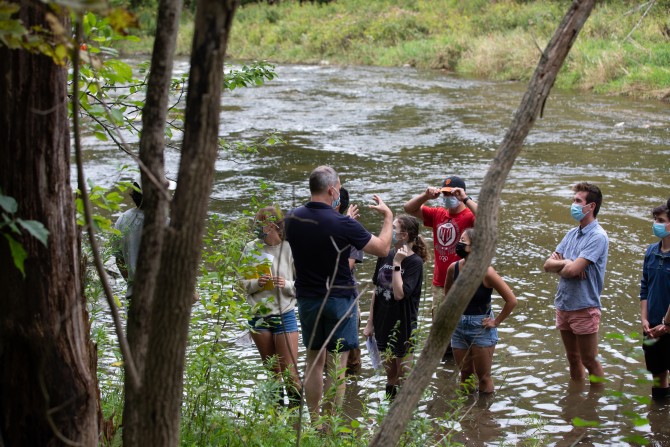Sr. lecturer and research associate Marc Goebel, and post doctoral associate Kira Treibergs, both in the department of natural resources and the environment (CALS), have developed a collaborative learning experience in Introductory Field Biology (NTRES 2100).
News directly from Cornell's colleges and centers
Field biology changes student perspectives
By Dave Winterstein
Addressing the complex issues that affect the natural world in which we live requires understanding nature in new ways. Introductory field biology (NTRES 2100) challenges students to do just that; to see their environment in new ways and observe plants and animals in their natural environment.
While NTRES 2100 has been a fixture at Cornell for more than 40 years, it is currently part of a project, funded by the Active Learning Initiative (ALI), to refocus courses on critical thinking and collaborative learning. Instructor Marc Goebel, senior lecturer and research associate, and ALI postdoc, Kira Treibergs, both in the department of natural resources and the environment in the College of Agriculture and Life Sciences, have worked to enhance the field experience and implement team research projects.
“The reason why field courses are so important is that students get hands-on experience researching and identifying animals and plants in their natural environment,” said Goebel.
For Goebel, this means learning to read the landscape. The opportunity to spend time in the field helps build student confidence; it is hands-on training, and it fosters curiosity.
Commenting on student learning, Treibergs said, “beyond the course content, they are observing nature and being curious together in a way that really forms relationships, and I think the students take away from the class connections and social interactions.”
Treibergs also said that unexpected things happen in the field, and students sharing those moments together helps creates a sense of community.
This sense of community contributes to student success in their research projects as well. Students have to go beyond what they learn in the classroom and conduct research, from asking a question, to developing a hypothesis, identifying methods, collecting field data, and reporting their results. The focus of the assignment is as much about building teamwork skills as it is about going through the research process.
“We have them work in teams to get the true experience of scientific research,” said Treibergs. “Science is rarely done alone; it’s always done in collaboration.”
The instructors prepare students to work in teams so that the project work is equitable, effective, and enjoyable too. They begin the process by having students reflect on what makes teams successful.
Goebel & Treibergs then put students into teams based on mutual research and career interests. This is essential because the students themselves design every aspect of their projects; focusing on a topic in which they are interested helps them feel more invested in the work.
While Goebel focuses on the research outcome, he also gives students essential exposure to the research process from start to finish, noting that the students have limited time to carry out their field research.
“The importance of the research project also lies in the skills and understanding students gain by going through the entire process and overcoming any roadblocks they encounter,” he said.
Navigating the challenges of the field research process also helps build student confidence.
“Taking field biology changes students’ understanding of the environment around them,” said Goebel. “Students have come back to tell me they look at campus differently now. They can identify the plants and animals they see when walking to their next class. It is as if they see their world through different eyes now.”
This project was funded by a gift from Alex Hanson ‘87 and Laura Hanson ‘87. The Active Learning Initiative, developed within the College of Arts and Sciences with help from the Hansons, is supported by Cornell's Office of the Vice Provost for Academic Innovation and the Center for Teaching Innovation.
Dave Winterstein is a communication specialist at the Center for Teaching Innovation.
Media Contact
Get Cornell news delivered right to your inbox.
Subscribe

